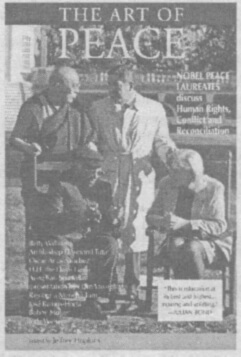| The following article is from the Summer, 2000 issue of the Snow Lion Newsletter and is for historical reference only. You can see this in context of the original newsletter here. |
Nobel Peace Laureates Discuss Human Rights, Conflict and Reconciliation
ed. by Jeffrey Hopkins
184 page, cloth, Aug. #ARPE $22.95
This is education at its best and highest...inspiring and uplifting.JULIAN BOND
The road to world peace will be long and difficult, but Hopkins helps lead the way with this landmark book.Kirkus Reviews
While many people strive to bring the world into peaceful balance, only a few have had such remarkable impact for their selfless efforts-bringing them international recognition as these nine outstanding individuals who convened recently at the University of Virginia to discuss the topics of Human Rights, Conflict, and Reconciliation. In a dynamic exchange, these Laureates shared their views with each other about the importance of basic human rights, their concerns about conflicts that arise when these rights are denied, and their practical ideas for achieving reconciliation.
At the core of their agenda is the conviction that morality is essential for personal, political, social, and economic balance. The Laureates:
Jose Ramos-Horta, East Timor; Betty Williams, Northern Ireland; Dr. Rigoberta Menchu Turn, Guatemala; Archbishop Desmond Tutu, South Africa; President Oscar Arias Sanchez, Costa Rica; Harn Yawnghwe, for Aung San Suu Kyi, Burma; Bobby Muller, Co-Founder of the International Campaign to Ban Landmines, and Jody Williams, United States; His Holiness the Dalai Lama, Tibet.
Biographies precede the presentations which are followed by questions from the participants.
One of the most wonderful aspects of this remarkable book is the interaction between the laureates...a banquet of views and ideas.Today's Librarian

The following is an excerpt from the foreword by Jeffrey Hopkins.
Bringing Together Great Hearts and Minds
Sometimes it may seem that beings on this planet have reached their present state through survival of the fittestand among the fittest, perhaps the most fierce, the most capable at combat. However, even more has been achieved tlirough cooperation, through friendslup, tlirough care and concent. We have found that no matter how coercively force is structured, it achieves limited and shaky results.
Also, sometimes it may seem that happiness depends solely on economic success or failure. However, to a greater extent happiness depends upon the morality of cooperation, friendslup, care, and concern. We have found that even though a modicum of economic success is essential. it is not sufficient for happiness.
Two types of experimentsone focused on state control and another focused on unbridled greedhave run their course; these have shown that without respect for human rights, conflict inevitably arises, thereby undermining the very control and economic development that are sought. Power and moneywhen not constrained from within each person out of a concern for others' rightseventually turn against themselves, undoing the benefits for which they were pursued.
While many who strive to bring the world into balance work in relative anonymity, several have received international recognition for their selfless efforts. Such is the case with the nine great hearts and minds who convened in Charlottesville at the University of Virginia for the Xobel Peace Laureates Conference on Human Rights. Conflict, and Reconciliation on November 5 and 6, 199S. presented by the University of Virginia and the Washington-based Institute for Asian Democracy. These activists shared with the world and with each other their iews about the importance of recognizing basic human rights, their concerns about the conflicts that arise when these rights either are not perceived or are denied, and their ideas for achieving reconciliation. At the core of their agendas is the conviction that morality is essential for personal, political, social, and economic balance. They believe that without a personal ethic that includes compassion for other beings, mere self-concem will eventually undo the fabric even of one's own life.
Jose Ramos-Horta of East Timor calls on us to recognize the right to self-determination, especially in territories that have been annexed by other nations. He notes that such people are treated as expendable and traces this attitude of negligence ultimately back to ignorance. Lack of knowledge of what is marked out as other leads to prejudice and then to distrust and fear. The result is that people in these areas are sacrificed for pretended pragmatism. The solution is in dialogue, discussion between communities.
Betty Williams from Northern Ireland brings into vivid perspective the effective force of women and children to readjust the priorities of the world and stop conflict and war. Stemming from her wish to protect her own children from destruction by a society bent on making the littlest suffer, she calls for action based on caring motivation. She movingly provides us with a Universal Declaration of the Rights of the World's Children, asking that we pass beyond compassionate tears to action.
Dr. Rigoberta Menchu Turn of Guatemala emphasizes that indigenous peoples use conversation and dialogue to solve problems and can serve as sources of inspiration for an intercultural world. She calls for us to value the rights of indigenous peoples for our own good and insists that we recognize their rights so that they can break free of stereotypes that lead either to silent ghettoiza- tion or to patronizing overprotec- tionism. Legal patterns built on the assumption of a homogenous people need to be amended to take account of the multivalent cultures within nations. Hers is a voice ringing with respect for diversity.
Archbishop Desmond Tutu of South Africa eloquently makes a case for restorative justice, for reconciliation upon sincere public recognition of past misconduct, restoring harmony. Celebrating God's creation, he emphasizes our incredible capacity for goodness, despite a capacity for incredible evil. He advocates avoiding revenge on the one hand and blanket amnesty on the other and provocatively makes the case that, with true acknowledgment of guilt, the healing power of forgiveness makes retributive justice neither necessary nor helpful in certain transitional situations. (For a full account of his views and work on the Truth and Reconciliation Commission, see Archbishop Tutu's No Future Without Forgiveness, published by Dou- bleday, 1999.)
President Oscar Arias Sanchez of Costa Rica presents an alarming host of facts and figures that document the ridiculous waste of money and resources in arms proliferation the warped mentality that seeks profit out of exacerbating poverty. His methodical presentation of misplaced priorities and disproportionate wealth rings with the power of a reasoned, compassionate plea for economic reform. He warns of the rapid changes inflicted by a pattern of globalization based on greed and speculation, rather than on human need. Advocating an International Code of Conduct on Arms Transfers to regulate and monitor weapons sales, he calls for reorientation toward human security, which is founded on concern with human life and dignity, appreciating diversity, and stressing education.
Harn Yawnghwe, participating on behalf of Aung San Suu Kyi of Burma, presents a brilliant, step-by-step analysis of the obfuscating formulation of the amorphous camps East and West and the misuse of this concept by certain Asian politicians to suggest that Asians are not committed to human rights. He shows that, at its origin, the Universal Declaration of Human Rights actually had strong support from smaller countries in the third world and that the notion of supposedly different Asian values was seized upon by Asian dictators as an excuse for repression. He documents how democracy and human rights are not at odds with actual Asian values and patiently draws us to realize that there are universal aspirations to democratic principles, specifically in Burma.
Bobby Muller of the United States, co-founder of the International Campaign to Ban Landmines, which was a co-recipient of the Peace Prize, contrasts Archbishop Tutu's presentation of restorative justice with the deterrent value of retributive justice. First telling his own story as a marine volunteer for the Vietnam War, becoming disillusioned with the war, and after being wounded, becoming disgusted with Veteran's Administration hospital care, he inspiringly describes the persistent long-term process of promoting legislation to ban landmines. He gives insights into the importance of individual initiative and the vagaries of trying to change entrenched attitudes.
Jody Williams of the United States, drawing on long experience with the worldwide effort to ban landmines, speaks with a gripping call to action. Describing a new model for activism based on the globalization of citizens' movements, she emphasizes the need for coalition members to respect each other's independence within working cooperatively. Activists should work consistently and intelligently to dissolve the barriers of distrust between government and civil society on issues often considered by government to be beyond the purview of ordinary citizens. Warning that governments can be disrupted by this new mode of activism, she calls for maintaining the persistence of nuts-and-bolts drudgery and never falling into the trap of sentiment without action.
His Holiness the Dalai Lama of Tibet concludes the conference with a moving description of the need for a compassionate motivation and the need for knowledge of long- term consequences of actions, especially the negative effects of violence. He calls for inner disarmament moving beyond the concepts of we and they and narrow-minded nationalism in an interdependent world in which one's own and others' welfare are intertwined. Compromise is the only solution for the contradictions inevitably occurring in a diverse environment, and concern for others is a way to open one's own horizon and gain strength. Observing that the human race has become more mature, he suggests that we set as our long-term goal global disarmament, stressing that through hope and determination the seemingly impossible can be achieved.
With a clarion call, these nine great hearts and minds insist in concert that:
ä»_ knowledge needs to undermine ignorance
ä»_ compassion must dissolve intolerance
ä»_ coordinated activism has to replace passive acceptance and despair
ä»_ dialogue must transform recrimination
ä»_ innovative justice has to displace vengeance
ä»_ morality needs to supplant emphasis on the bottom line in commerce and law
ä»_ recognition of universal rights must unseat disenfranchisement
ä»_ determination over a long period of time is required to overcome entrenched forces
ä»_ transformation of motivation must accompany action.
By organizing this conference and publishing the presentations, I hope to encourage attention to and discussion of these topics. It is my hope that by witnessing these conversations by and among the Nobel Peace Laureates, and through probing and absorbing their meaning, we will be stimulated to reflect on the often complicated and difficult implementation of attitudes and techniques for peace.

